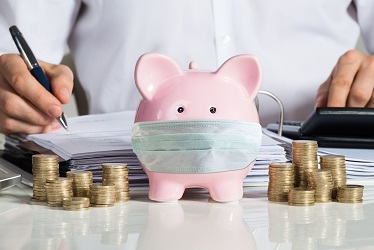If you have free time due to social distancing, use it to sort through your finances in preparation for an economic downturn. Taking action now will give you confidence as the economy slowly recovers.
Here are two lists to help you begin. The first list is if your cash flow is adequate. The second list is if you’re struggling with your cash flow.
If your cash flow is adequate, here are four things to address:
1- Update your financial plan.
If you don’t have a financial plan, then interview several financial advisors. A comprehensive plan goes beyond investment analysis.
It includes an assessment of your net worth, income, spending, retirement shortfall, and saving goals for other things/experiences you want from life.
2- Determine if you can increase your wealth.
When there’s an economic downturn, many assets drop in value. If it fits your investment strategy and if you have cash available, then develop a plan to purchase assets when prices are low.
These assets could be investment securities or real estate. It could also be business acquisitions.
3- Verify your emergency reserve is sufficient.
An emergency reserve is money you may need if there is an unexpected event. It could be damage to your home due to Mother Nature, an accident, or unplanned maintenance.
It could be a critical medical diagnosis that increases your health care expenses. And it could be losing your job. Your cash flow may be sound now, but it could change if you were laid off or asked to retire early.
Target saving money to cover 9 months of expenses if you are a dual-income household. If you are a single-income household, then increase the amount to cover 12 months of expenses.
4- Review your financial accounts.
If it’s become cumbersome to manage multiple financial accounts, then consider consolidating where necessary. For each financial account, check “transfer on death” and beneficiary information.
Also, verify that you have a power of attorney (“POA”) identified in the event you can no longer make decisions. A financial power of attorney can be as limited or as broad as you want it to be.
Most financial institutions have their own POA documents and prefer using them – so check with your bank before retaining an attorney.
If you’re struggling with your cash flow, here are four things to address now:
1- Reduce non-essential expenses.
Identify which expenses are essential. This category includes your rent/mortgage, main utilities, basic food needs, home insurance, car insurance, and other expenses necessary to live.
The remaining expenses are non-essential expenses. It includes spending on “nice to have” items/experiences. Decide which ones can be eliminated or reduced (e.g., subscription services).
2- Develop a spending plan (another way of saying “budget”).
Target living off of 80 percent of your take-home pay (income deposited into your checking account – your gross income less taxes less payroll deductions).
The remaining 20 percent of your money should go towards savings, including building your emergency reserve.
You may need to cut expenses gradually to reach 80 percent. If you have a deficit, go back to your non-essential expenses and reduce it further.
3- Reduce optional payroll deductions.
Your paycheck stub shows deductions made to your gross income. These deductions include benefits your employer offers.
Some of these benefits are optional. Ask your HR department to identify which benefits you could remove or reduce to increase the amount of your take-home pay.
4- Find part-time work.
There are two ways to improve your cash flow – decrease spending and/or increase your income. If you have time during the weekend or even during the weekdays, find a part-time job.
It may not be an ideal situation, but it will be temporary – and you can do anything for a short period of time. A part-time job will generate additional income to alleviate the stress you have with your cash flow.
With many businesses closed during social distancing, it will take a while before our economy returns to where it was at the beginning of the year.
Be proactive with your finances. Use any downtime you have now to make a plan of action.
ABOUT THE AUTHOR:
 Niv Persaud, CFP®, CDFA™, RICP®, CRPC®, is the Founder of Transition Planning & Guidance, LLC. Life is more than money. It’s about living the lifestyle you want and can afford. For that reason, Niv consults with clients on money, life, and work. Her approach capitalizes on techniques she learned throughout her career, including as a management consultant, executive recruiter, and financial advisor. Her services include developing spending plans, comprehensive financial plans, divorce financial reviews, retirement plans. Niv actively gives back to her community through her volunteer efforts. She believes in living life to the fullest by cherishing friendships, enjoying the beauty of nature and laughing often — even at herself. Her favorite quote is by Erma Bombeck, “When I stand before God at the end of my life, I would hope that I would not have a single bit of talent left and could say ‘I used everything you gave me.’”
Niv Persaud, CFP®, CDFA™, RICP®, CRPC®, is the Founder of Transition Planning & Guidance, LLC. Life is more than money. It’s about living the lifestyle you want and can afford. For that reason, Niv consults with clients on money, life, and work. Her approach capitalizes on techniques she learned throughout her career, including as a management consultant, executive recruiter, and financial advisor. Her services include developing spending plans, comprehensive financial plans, divorce financial reviews, retirement plans. Niv actively gives back to her community through her volunteer efforts. She believes in living life to the fullest by cherishing friendships, enjoying the beauty of nature and laughing often — even at herself. Her favorite quote is by Erma Bombeck, “When I stand before God at the end of my life, I would hope that I would not have a single bit of talent left and could say ‘I used everything you gave me.’”
More “Personal Finance” Posts:

